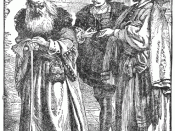Prejudice is a significant theme in The Merchant of Venice. This is expresses at various occasions throughout the novel. One of the most significant examples of prejudice in this novel is the Anti-Semitic views of the Christian citizens in Venice. A second act of prejudice in The Merchant of Venice occurs when the Prince of Morocco arrives in Venice. The third example, though more subtle, is the prejudice towards the Prince of Arragon. These three examples fall in to two major categories, racial prejudice and religious prejudice.
The Anti-Semitic views in The Merchant of Venice play an important part in the novel. Without the Anti-Semitic views, the elopement plot and the bond plot would not be in existence. If Jessica were Christian, Shylock would have embraced the marriage of Lorenzo and Jessica. Religion, however, intervenes and causes Shylock's anger at his daughter. The bond plot simply is based on religious tension.
Shylock the Jew would not have been so hostile towards Antonio and Bassanio had they all been Jewish or Christian. The behavior in the court room also made a heavy contribution to the Anti-Semitism in The Merchant of Venice .The punishments for Jews were far worse than those given to Christians. Jews had seriously harsh restrictions allowing them to only be money-lenders.
The second example of prejudice occurs between Portia and the Prince of Morocco. This prejudice, however, is not religious like the prejudice between Shylock and Antonio, but is more of a form of racial prejudice. As the second act begins, Morocco states, "Mislike me not for my complexion, the shadowed livery of the burnished sun." (2.1.1-2). This was said to Portia to ask her not to judge the prince on his complexion, but rather that he be judged on what is inside of him. Portia, however,


